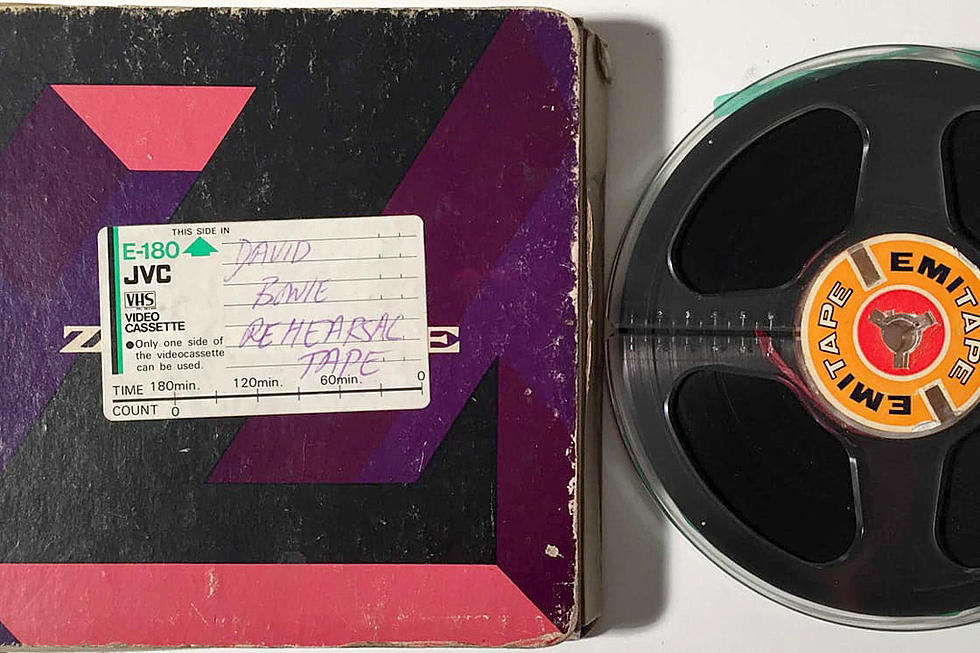
40 Years Ago: David Bowie Reinvents Compilation Albums With the Landmark ‘Changesonebowie’
Radiohead released their first album in five years a couple weeks back. But taking that long was a luxury that wasn't available to artists in the '70s. Back then, the only way to protect your spot in the overcrowded record bins was to release at least one new record every year. Lucky for us.
That kind of market pressure led to some of the greatest runs of albums in music history, among them David Bowie's early '70s output. Beginning with his self-titled 1969 album (re-released as Space Oddity in '72) through '75's Young Americans, the iconoclastic singer released eight essential albums; well, essential to diehard fans, anyway. Eight LPs contain a tremendous amount of music but rarely many hits. Non-completists who just wanted the radio songs were out of luck after eight great records. A compilation package was in order – an 11-track survey of an already enviable catalog.
Released in May 1976, Changesonebowie begins where Bowie the artist begins in the collective imagination: not with his 1964 debut single "Liza Jane," but with his 1969 hit "Space Oddity." Even in 1976, it was already a bona fide classic, but it was the odd man out when it originally appeared on the singer's second (and second self-titled) album. David Bowie was a hippie, acoustic singer-songwriter album featuring song titles like "Memory of a Free Festival" and "Unwashed and Slightly Dazed." Especially in the post-Ziggy Stardust "Starman" era, casual fans didn't have much use for the flaxen-haired pseudo-Bob Dylan vibe of David Bowie. It was perceived as your standard "buy it for the hit" fare, so finally being able to pick up "Space Oddity" on a compilation was a treat.
Today the inclusion of an unreleased track or two is mandatory for greatest hits packages, but that wasn't always the case. For U.S. fans, Changesonebowie was their first chance to own "John, I'm Only Dancing" as anything other than an import. The track hadn't appeared on an album previously, having only been released as a U.K. single back in '72. (RCA refused to release the track upon its initial release due to its possibly homoerotic lyrics.) While the Beatles' Hey Jude (which features tracks that hadn't been compiled on studio albums), beat Changesone to the market by a good six years, this was still an unusual move for an artist of Bowie's stature in 1976.
Bowie's first truly great album, Hunky Dory, is represented by the sublime "Changes." Like "Space Oddity," this was a career defining track. Most likely to the singer's chagrin, as the next forty years of retrospective articles mentioned his many "ch-ch-changes," but no compilation would be complete without it.
The Rise and Fall of Ziggy Stardust and the Spiders from Mars was the powder keg that launched Bowie into the superstar orbit in which he remained for the rest of his life. One might expect more than two songs ("Ziggy Stardust" and "Suffragette City") from such an essential album to make the compilation cut, but why? Unlike the previous albums, this was one that both the Bowiephiles and the casual fans had in their stacks. What made these tracks' inclusion on a greatest hits package unique was this: At the time that the Ziggy album was released, neither song had ever been released as a single. "Suffragette City" wasn't a "hit" in the traditional sense of the term until it was released as a single in support of the Changesonebowie compilation, and "Ziggy Stardust" was never more (release speaking, that is) than an album track.
Side one of the album closes with "The Jean Genie," the only representative cut from Aladdin Sane, and the only time in music history that an allusion to Jean Genet hit the pop charts.
Side two compiles two tracks each from Diamond Dogs (the title track and "Rebel Rebel") and Bowie's '75 "plastic soul" classic Young Americans (the title track and "Fame"). The album's closer is Station to Station's "Golden Years," which was released only five months prior to Changesonebowie. It's the perfect closer, as inevitably Bowie's golden years are precisely what his first compilation captures. The album essentially carved into vinyl the early Bowie canon.
Up next was the "Berlin trilogy," a period of enormous creative growth and slightly lower sales that continued until the singer reemerged in his 1983 Let's Dance guise: tanned, perfectly coiffed and pastel-suited. RCA went back to the well in 1981 for a follow-up entitled Changestwobowie, but it didn't fare as well. Perhaps the timing was bad: Two years later they would have caught the Let's Dance wave.
Three albums weren't represented on Changesonebowie, the first being his 1967 self-titled debut on the Deram label. One can reasonably assume that RCA didn't want to negotiate with a competitor to license songs, but the safer money is on the simpler answer: David Bowie is not a very good album. The artist himself kept his distance from the record for the majority of his career, not revisiting songs like "Silly Boy Blue" for 35 years.
His third album and second for RCA, The Man Who Sold the World, remained mostly unknown outside Bowiephile circles until Nirvana revived the title track during their 1993 MTV Unplugged appearance. No compilation today would be complete without that cut, but in 1976 nothing about The Man Who Sold the World seemed retrospective worthy. Like his debut, it was considered something of an evolutionary misstep, a fish with feet.
The final omission was 1973's Pin Ups, a covers album that produced no U.S. singles, though the majestic "Sorrow" was released internationally and made the top five in his native U.K.
Since the release of Changesonebowie, numerous Bowie compilations have been released that are much more comprehensive than this 1976 classic, but they don't perfectly capture one moment in time, nor were they meant to. The Bowie catalog reads almost like sedimentary layers: juvenilia, major label success, the Berlin trilogy, '80s pop superstardom, '90s electronica resurgence and 21st century postmodernism.
While collections like Nothing Has Changed provide great career overviews, they tend to be too comprehensive for the casual listener. To this day Changesonebowie (or its Rykodisc relaunch, Changesbowie) remains the definitive compilation of what many consider the high point of the great man's storied career. One can only dream of a Changesthree that does the same for his '80s output, or a Changesfour that captures his '90s return to experimental form.
Rarely does a greatest hits package get the 40th anniversary treatment, but you can experience the magic yourself on the recently released remastered version on 180-gram vinyl.
Worst to First: Every David Bowie Album Ranked
More From Diffuser.fm









